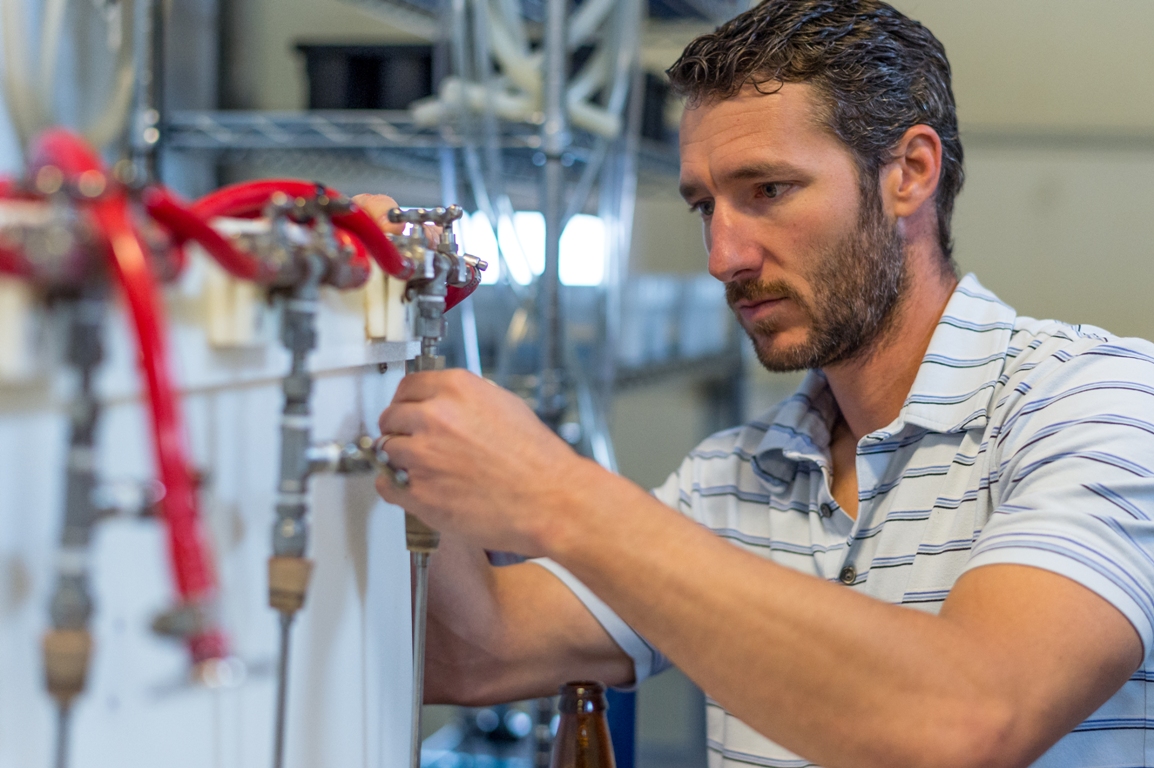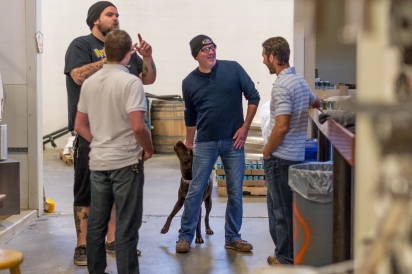CRAFT BEVERAGE INCUBATOR Entrepreneurs share equipment and advice in a former brewery space
When Payette Brewing Company moved from Garden City into a new $4.5 million space near the Boise River, its owners intended to keep the original taproom open and use the facility as a research and development “laboratory” for craft beer. To the dismay of Garden City regulars, the original taproom closed less than six months after the new building opened.
But artisan beer, cider, coffee and soda continue to pour out of the Garden City brewery. While Payette still works on experimental brews and stores about three dozen barrel-aged beers in that space, other craft beverage makers also use it in a variety of ways. For instance, BuckSnort Soda Company uses the facility for cold storage, Longdrop Cider Company brews and bottles its products there and Café Mulé steeps coffee in a refrigeration unit that once held kegs.
The result is a building where craft beverage makers share more than equipment and space; they advise each other on what’s worked for them and what hasn’t, fostering an atmosphere conducive to entrepreneurship. Though some may consider Payette’s operation in Garden City as similar to a traditional contract manufacturer, the company states it’s not focused on making money exclusively off volume and razor-thin margins. Instead, it’s a different type of business model that tries to consider the needs of craft drink entrepreneurs while keeping an eye on the bottom line.
Mike Francis founded Payette Brewing in 2010 and opened the first taproom and brewery off of Chinden Boulevard in an industrialized area of Garden City. Except for a bank down the street, warehouses and utilitarian buildings are the norm. The brewery was the first in a wave of craft beverage businesses that decided to open on or near Chinden, including Barbarian Brewing, Bella, County Line, Crooked Fence, Meriwether Cider and Powderhaus Brewing Company.
Initially, Francis said, they kept the Garden City facility open for practical reasons: They needed to keep brewing for a few months as they transitioned to the new space and they had two years left on a recently signed lease. But once the move was complete, Francis was faced with the predicament of keeping a building that was costing more money than it was making, or finding a way to at least break even.
That’s when Sawtooth Brewery temporarily came into the picture. The Wood River Valley company used Payette’s available space and equipment for about six months while they closed their original Ketchum location and installed a new production system at a larger facility in Hailey.
According to Sawtooth CEO and owner Paul Holle, Payette brewers made beer from Sawtooth’s proprietary recipes and processing standards
in Garden City. This temporary arrangement ended when the Hailey space was up and running and Sawtooth could brew and package all their beer back in the Wood River Valley again.
Meanwhile, BuckSnort started to store soft drinks in the facility’s refrigerators. And Longdrop Cider makers were getting crammed at their space in Eagle and were eager to move near their new tasting room in downtown Boise. For Café Mulé, the original Payette space was a better fit than commercial kitchens at Whole Foods or Guru Donuts, where it was difficult to hose down spilled coffee around baking ingredients and other commercial equipment.
For Francis, the facility’s new role is a work in progress.
“It’s a different model than the beer so it’s a learning curve for me to try to figure out how to arrange things so it works for us and the other businesses,” he said.
Despite these unknowns, current occupants are grateful to share space, equipment, experience and knowledge with Francis and other upstart beverage makers.
“Mike’s been incredibly supportive of me and my company,” said Kainoa Lopez, owner of BuckSnort. “He’s been helpful all along the way and opened up his playbook for us.”
BuckSnort hopes to start canning their soda in the near future and Lopez said Francis has been advising him about this possible new venture.
Café Mulé owner Matt Bishop wore rubber boots as he finished up bottling his cold brew coffee using Longdrop Cider’s equipment.
“That’s one of the advantages of being here,” he said. “I think everyone’s very respectful and lets one another know what they’re sharing.”
Bishop added, “There have been plenty of things we’ve learned as we’ve grown. And these guys have helped us out.”
Whether Payette Brewing continues to operate the original space as an ad hoc incubator for beverage makers is a decision that Francis said he and his investors will make in the near future. “I hope by the end of 2017 we can look back and say either this made sense or we can change this,” he said.






